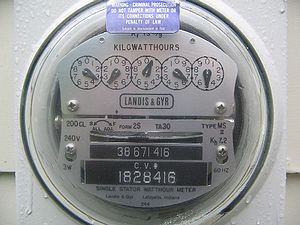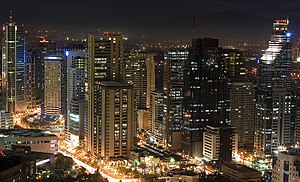 Image via Wikipedia
Image via WikipediaPROFITS OF Manila Electric Co. (
Meralco), the country’s largest
power utility, more than doubled last year following an increase in distribution rates.
In a report to the stock exchange, Meralco said consolidated profits went up by 114% to P6 billion or P5.42 per share, from the prior year’s P2.8 billion.
Meralco said this was “attributable mainly to a slightly higher volume of energy sold and to an adjustment in distribution rates” implemented in May last year. The P0.257 per kilowatt-hour (
kWh) hike in distribution charges came a month after the utility was allowed by the Energy Regulatory Commission (ERC) to adopt the performance-based regulation (PBR) scheme, retiring the eight-decade-old return-on-rate-base scheme.
The shift to the more profitable PBR coincided with the entry of new shareholders -- Philippine Long Distance Telephone (
PLDT) Co. and Metro Pacific Investments Corp. as well as
San Miguel Corp.
Under PBR, the
electric utility may increase rates by meeting pre-set performance incentive schemes which is supposed to involve rewards and penalties that will force utilities to become more efficient. The previous cost-plus scheme pegged rates on historical costs plus a reasonable
rate of return.
The company’s consolidated core net income, which excludes one-time exceptional charges, grew by 169% to P7 billion from P2.6 billion in 2008. Meralco has a policy of distributing half of core profits as dividends.
Consolidated revenues, which is 97% accounted for by electricity sales, dipped 3.6% due to an average decrease of P0.69/kWh in generation and transmission charges for 2009. This was, however, partially offset by an increase in power consumption and the higher distribution charge.
The May 2009 rate hike also pushed the company’s free cash flow up to P18.8 billion from just P500 million in 2008.
Meralco managed to pare down debts by P19.6 billion last year and refunded P1.8 billion to customers. The utility ended 2009 with a gross debt balance of P20.7 billion.
Manuel M. Lopez, company chairman, said 2009 saw “outstanding results” in profits, cash flows, debt profile and operating efficiency.
Meralco, together with 65%-owned subsidiary Clark Electric Distribution Corp., sold 27,516 gigawatt-hours last year, a 1.7% growth.
The system loss rate stood at 8.61%, below the cap of 9.5% of
total output set by the ERC. This is a measure of how much power is lost in the distribution system from pilferage as well as technical limitations.
Analyst Fernando Y. Roxas of Eagle Equities, Inc. said it may be difficult for Meralco to top the 2009 performance this year.
“It’s a little better than expected, although it’s actually too high.
Utilities are not expected to grow this fast, except due to one-off gains. It might be hard for them to repeat the same level of growth this year,” Mr. Roxas said in a phone interview.
Mr. Roxas also said the recent Commission on Audit report on Meralco, which found about P7 billion in excess revenues for 2004 and 2007, may affect investor sentiment on the company.
Mr. Lopez, however, said in Meralco’s disclosure that the utility would not “hesitate to challenge any judgment and speculations on overcharging, which may raise undue public expectation of a refund.”
Analyst Astro C. del Castillo, managing director of First Grade Holdings, Inc., said Meralco’s 2009 performance reflected the company’s efficiency.
“It’s basically the performance of the company catching up with the new management. Despite the boardroom battles we’ve seen last year, the company was nevertheless expected to be efficient,” Mr. del Castillo said in a phone interview.
National Association of Electricity Consumers for Reform President Pete Ilagan said the profit increase of Meralco last year was “unreasonable” and came “at the expense of consumers.”
“They are now becoming very profit-oriented which is not in keeping with the principles of a public utility. They should immediately file for a rate reduction with the ERC,” Mr. Ilagan said in a phone interview.
From a P350-million net loss in 2005, Meralco posted P3.5 billion in
earnings for 2006. This grew to P3.8 billion in 2007 and declined to P2.8 billion the year after due to regulators’ decision to disallow the recovery of generation and transmission charges.
Meralco shares went up by 1.84% to P163.00 apiece yesterday. The stock hit a record high of P302.50 last year amid the scramble for control between the PLDT group and San Miguel.
The Lopezes and PLDT have an alliance to fend off any
hostile takeover.
Mediaquest Holdings, Inc., a subsidiary of the Beneficial Trust Fund of PLDT, has a minority stake in BusinessWorld.
Jose Bimbo F. Santos
February 23, 2010
http://www.bworld.com.ph/weekender/content.php?id=6780
 Image via WikipediaMANILA, Philippines The strong domestic retail market continues to paved the way for more property developments and expansion not only in major urban centers like Metro Manila but throughout the country. The expansion is being followed rapidly by BPO and call center companies as they moved to the Next Wave Cities.
Image via WikipediaMANILA, Philippines The strong domestic retail market continues to paved the way for more property developments and expansion not only in major urban centers like Metro Manila but throughout the country. The expansion is being followed rapidly by BPO and call center companies as they moved to the Next Wave Cities.








